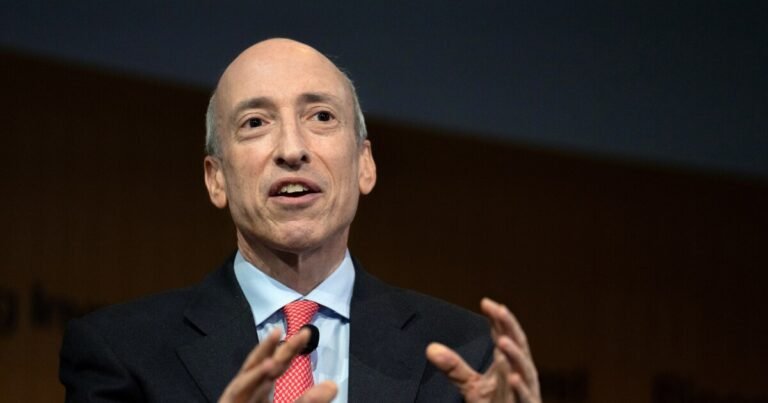Seven months after the Securities and Exchange Commission
The State of Wisconsin Investment Board, which manages the assets of the Wisconsin Retirement System, recently invested roughly $188 million in five different types of crypto industry assets, according to an SEC filing last month.
Those investments include 2,450,400 shares of iShares Bitcoin Trust, a bitcoin spot exchange-traded fund created by BlackRock in January 2024; 1,013,000 shares of Grayscale Bitcoin Trust, a security that allows investors to trade shares in trusts containing sizable pools of bitcoin; 110,291 shares of Cipher Mining Inc., an industrial-scale bitcoin mining operation; 92,466 shares of Coinbase Global Inc., the operator of a prominent cryptocurrency exchange platform; and 17,428 shares of Blockchain Coinvestors, a venture capital firm which invests in early-stage blockchain companies.
Bloomberg News
The Public Employees Retirement System of Ohio, or OPERS, recently invested $17.63 million in Coinbase, according to a May 15 SEC filing.
And the State of Michigan Retirement System recently invested a little over $6.597 million in bitcoin, buying 110,000 shares in an exchange-traded fund that seeks to track the daily performance of bitcoin, according to a holdings report as of June 30 that was filed with the SEC last month.
In 2021 and 2022, it invested roughly $2,442 in nearly 30,000 shares of Coinbase, according to SEC filings. In the two years since then, the pension system has invested a total of $45 million in crypto, a state treasury spokesman told the
Wisconsin’s pension system is fully funded, and the state has earned bond ratings of AAA, Aa1 and AA-plus from Kroll Bond Rating Agency, Moody’s Ratings and S&P Global Ratings.
Ohio has across-the-board triple-A ratings from Fitch Ratings, Kroll Bond Rating Agency (which rated the state’s GO highway capital improvement bonds in November), Moody’s and S&P following
And Michigan is rated AA-plus, Aa2 and AA by Fitch, Moody’s and S&P.
Wisconsin’s SWIB managed over $156 billion in assets as of Dec. 31, 2023, so the pension system’s crypto investments represent a little more than 0.12% of its portfolio. A spokesperson for the SWIB said the board does not comment on investment strategy or specific investment decisions.
The other Midwest state pensions’ investments are likewise a tiny fraction of their total assets under management.
Still, the choice from widely respected pension systems to put money behind a currency that
Bitcoin is a fiduciary rather than a commodity-based currency.
Fiduciary currencies “have no intrinsic value, and derive their value in exchange either from government fiat or from the belief that they may be accepted by someone else,” the
When
Gensler cautioned that the action “should in no way signal the Commission’s willingness to approve listing standards for crypto asset securities,” and it did not signal broader approval by the SEC of crypto assets.
“Bitcoin is primarily a speculative, volatile asset that’s also used for illicit activity including ransomware, money laundering, sanction evasion, and terrorist financing,” Gensler said. “While we approved the listing and trading of certain spot bitcoin ETP shares today, we did not approve or endorse bitcoin. Investors should remain cautious about the myriad risks associated with bitcoin and products whose value is tied to crypto.”
And yet, according to a
“Government-sponsored pension plans are the most likely to be invested in cryptoassets,” the report noted. It found that 94% of state or government pension plan sponsors surveyed were invested in crypto, while only 32% of retail investors had invested in cryptocurrencies.
The countries surveyed by CFA included the United States, India, the United Arab Emirates, Brazil, South Africa, Mexico, Singapore, China, Germany, Japan, France, Hong Kong, the UK, Australia and Canada.
In the U.S., the Fairfax County Employees’ Retirement System and the Fairfax County Police Officers Retirement System became the first public pension systems to invest in crypto-related assets when
Most U.S. public pension systems’ investments in crypto account for smaller shares of their assets under management. But as the Detroit Free Press noted, as crypto starts trading in the same direction as stocks, a major justification for investing in it — that it is less correlated with equities and thus may lower risk — starts to look more questionable.
And while crypto may present a tempting way to juice returns for some of the Midwest’s less well-funded pension systems, it’s prone to dramatic
There is also the 2022 bankruptcy of FTX, the cryptocurrency exchange founded by Sam Bankman-Fried, who was sentenced to 25 years in prison in March for defrauding investors.
In a
“A year and a half away from the FTX collapse, we’ve seen significant recoveries in bitcoin and other cryptocurrencies,” Scott Beal, co-chair of the private funds and asset management group at Barnes & Thornburg, said in the report. “The SEC’s approval of bitcoin ETFs is a big deal for the industry and may also increase the willingness of allocators to make investments in private crypto funds and other nonregulated products.”

